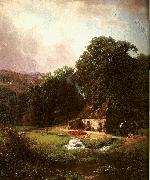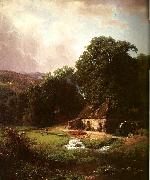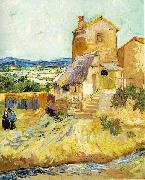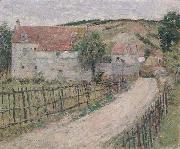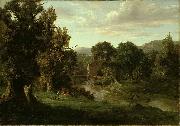Wholesale Oil Painting No Minimum |
|||||||||||
|
|
|||||||||||

|
|||||||||||
|
|
|
||||||||
Albert BierstadtGerman-born American Hudson River School Painter, 1830-1902 Bierstadt was born in Solingen, Germany. His family moved to New Bedford, Massachusetts, in 1833. He studied painting with the members of the D??sseldorf School in D??sseldorf, Germany from 1853 to 1857. He taught drawing and painting briefly before devoting himself to painting. Bierstadt began making paintings in New England and upstate New York. In 1859, he traveled westward in the company of a Land Surveyor for the U.S. government, returning with sketches that would result in numerous finished paintings. In 1863 he returned west again, in the company of the author Fitz Hugh Ludlow, whose wife he would later marry. He continued to visit the American West throughout his career. Though his paintings sold for princely sums, Bierstadt was not held in particularly high esteem by critics of his day. His use of uncommonly large canvases was thought to be an egotistical indulgence, as his paintings would invariably dwarf those of his contemporaries when they were displayed together. The romanticism evident in his choices of subject and in his use of light was felt to be excessive by contemporary critics. His paintings emphasized atmospheric elements like fog, clouds and mist to accentuate and complement the feel of his work. Bierstadt sometimes changed details of the landscape to inspire awe. The colors he used are also not always true. He painted what he believed is the way things should be: water is ultramarine, vegetation is lush and green, etc. The shift from foreground to background was very dramatic and there was almost no middle distance Nonetheless, his paintings remain popular. He was a prolific artist, having completed over 500 (possibly as many as 4000) paintings during his lifetime, most of which have survived. Many are scattered through museums around the United States. Prints are available commercially for many. Original paintings themselves do occasionally come up for sale, at ever increasing prices. |
||||||||
|
|
||||||||
The Old Mill
The Old Mill Painting ID:: 2516 |
1855
43.50 x 37.76 in / 110.5 x 95.9 cm
Private collection 1855 43.50 x 37.76 in / 110.5 x 95.9 cm Private collection |
|||||||
|
|
||||||||
Bierstadt, AlbertThe landscape painter Bierstadt joined a surveying expedition to the western United States in 1858 after studying painting in Germany. |
||||||||
|
|
||||||||
|
|
The Old Mill
The Old Mill Painting ID:: 10766 |
1855, oil on canvas, private collection 1855, oil on canvas, private collection |
||||||
|
|
||||||||
Vincent Van GoghDutch Post-Impressionist Painter, 1853-1890 Vincent Willem van Gogh (30 March 1853 ?C 29 July 1890) was a Dutch Post-Impressionist artist. Some of his paintings are now among the world's best known, most popular and expensive works of art. Van Gogh spent his early adult life working for a firm of art dealers. After a brief spell as a teacher, he became a missionary worker in a very poor mining region. He did not embark upon a career as an artist until 1880. Initially, Van Gogh worked only with sombre colours, until he encountered Impressionism and Neo-Impressionism in Paris. He incorporated their brighter colours and style of painting into a uniquely recognizable style, which was fully developed during the time he spent at Arles, France. He produced more than 2,000 works, including around 900 paintings and 1,100 drawings and sketches, during the last ten years of his life. Most of his best-known works were produced in the final two years of his life, during which time he cut off part of his left ear following a breakdown in his friendship with Paul Gauguin. After this he suffered recurrent bouts of mental illness, which led to his suicide. The central figure in Van Gogh's life was his brother Theo, who continually and selflessly provided financial support. Their lifelong friendship is documented in numerous letters they exchanged from August 1872 onwards. Van Gogh is a pioneer of what came to be known as Expressionism. He had an enormous influence on 20th century art, especially on the Fauves and German Expressionists. |
||||||||
|
|
||||||||
|
|
The Old Mill
The Old Mill Painting ID:: 59110 |
The Old Mill, (1888)
The Old Mill, (1888) |
||||||
|
|
||||||||
Theodore Robinson1852-1896 Theodore Robinson (July 3, 1852 ?C April 2, 1896) was an American painter best known for his impressionist landscapes. He was one of the first American artists to take up impressionism in the late 1880s, visiting Giverny and developing a close friendship with Claude Monet. Several of his works are considered masterpieces of American Impressionism. In 1884 Robinson returned to France where he would live for the next eight years, visiting America only occasionally. Robinson gravitated to Giverny, which had become a center of French impressionist art under the influence of Claude Monet. La Debacle, 1892, collection: Scripps College, Claremont, CaliforniaHistorians are unclear when Robinson met Monet, but by 1888 their friendship was enough for Robinson to move in next door to the famous impressionist. Robinson's art shifted to a more traditional impressionistic manner during this time, likely due to Monet's influence. While a number of American artists had gathered at Giverny, none were as close to Monet as Robinson. Monet offered advice to Robinson, and he likewise solicited Robinson for opinions on Monet's own works in progress. At Giverny, Robinson painted what art historians regard as some of his finest works. These depicted the surrounding countryside in different weather, in the plein air tradition, sometimes with women shown in leisurely poses. An example of his mature work during this period is La Debacle (1892) in the collection of Scripps College, Claremont California. |
||||||||
|
|
||||||||
|
|
The Old Mill
The Old Mill Painting ID:: 86005 |
Date c. 1892(1892)
Medium Oil on canvas
Dimensions 45.7 x 55.6 cm (18 x 21.9 in)
cjr Date c. 1892(1892) Medium Oil on canvas Dimensions 45.7 x 55.6 cm (18 x 21.9 in) cjr |
||||||
|
|
||||||||
George Inness1825-1894 George Inness Galleries George Inness (May 1, 1825 -August 3, 1894), was an American landscape painter; born in Newburgh, New York; died at Bridge of Allan in Scotland. His work was influenced, in turn, by that of the old masters, the Hudson River school, the Barbizon school, and, finally, by the theology of Emanuel Swedenborg, whose spiritualism found vivid expression in the work of Inness' maturity. He is best known for these mature works that helped define the Tonalist movement. Inness was the fifth of thirteen children born to John Williams Inness, a farmer, and his wife, Clarissa Baldwin. His family moved to Newark, New Jersey when he was about five years of age. In 1839 he studied for several months with an itinerant painter, John Jesse Barker. In his teens, Inness worked as a map engraver in New York City. During this time he attracted the attention of French landscape painter Regis François Gignoux, with whom he subsequently studied. Throughout the mid-1840s he also attended classes at the National Academy of Design, and studied the work of Hudson River School artists Thomas Cole and Asher Durand; "If", Inness later recalled thinking, "these two can be combined, I will try." Concurrent with these studies Inness opened his first studio in New York. In 1849 Inness married Delia Miller, who died a few months later. The next year he married Elizabeth Abigail Hart, with whom he would have six children. |
||||||||
|
|
||||||||
|
|
The old mill
The old mill Painting ID:: 97956 |
1849(1849)
Medium oil on canvas
Dimensions 75.9 x 107 cm
cyf 1849(1849) Medium oil on canvas Dimensions 75.9 x 107 cm cyf |
||||||
|
|
||||||||
|
George Inness 1825-1894 George Inness Galleries George Inness (May 1, 1825 -August 3, 1894), was an American landscape painter; born in Newburgh, New York; died at Bridge of Allan in Scotland. His work was influenced, in turn, by that of the old masters, the Hudson River school, the Barbizon school, and, finally, by the theology of Emanuel Swedenborg, whose spiritualism found vivid expression in the work of Inness' maturity. He is best known for these mature works that helped define the Tonalist movement. Inness was the fifth of thirteen children born to John Williams Inness, a farmer, and his wife, Clarissa Baldwin. His family moved to Newark, New Jersey when he was about five years of age. In 1839 he studied for several months with an itinerant painter, John Jesse Barker. In his teens, Inness worked as a map engraver in New York City. During this time he attracted the attention of French landscape painter Regis François Gignoux, with whom he subsequently studied. Throughout the mid-1840s he also attended classes at the National Academy of Design, and studied the work of Hudson River School artists Thomas Cole and Asher Durand; "If", Inness later recalled thinking, "these two can be combined, I will try." Concurrent with these studies Inness opened his first studio in New York. In 1849 Inness married Delia Miller, who died a few months later. The next year he married Elizabeth Abigail Hart, with whom he would have six children. The old mill 1849(1849) Medium oil on canvas Dimensions 75.9 x 107 cm cyf |
||||||||
|
|
||||||||
|
Prev Next
|
||||||||
|
|
||||||||
|
Related Paintings to George Inness :. |
||||||||
|
|
||||||||
|
CONTACT US |
